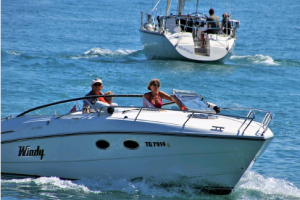The U.S. Coast Guard reports that there were over 4,000 boating accidents in 2017. Of those, 151 occurred in one of South Carolina’s waterways resulting in 13 lost lives, 52 non-fatal injuries, and nearly $3 million in damages.
Residents know that South Carolina’s lakes and reservoirs offer great fishing and beautiful views. However, easygoing fun in the sun turns dangerous, even deadly, far too often when vessel operators fail to prevent avoidable collisions. The reality is that the vast majority of boating accidents and waterway fatalities are preventable.
It is critical for vessel operators to be aware of all boating and water safety procedures, but it is also important for boat passengers, operators of personal watercraft, and swimmers to be aware of the rules that govern the waterways to engage safely and responsibly.
Getting Smart Before You Start!

South Carolina does not mandate boat safety education courses prior to licensing. Operators and drivers should educate themselves on boat operations, boating laws, navigation, and emergency situations. Passengers, swimmers, and operators of personal watercraft (such as kayaks) should also be aware of these rules, regulations, and procedures before hitting the water.
In 2015, the South Carolina Department of Natural Resources held several public forums on boat safety. Lack of education or willful defiance of boating safety regulations and procedures emerged as the biggest issue for South Carolina residents, particularly in the following areas:
- Ignorance of rules of navigation
- Wake zone violations
- Wake jumping
- Speeding
- Negligent operations
- Non-use of personal flotation devices
- Boating under the influence
- Diminished swimmer safety
- Lack of courtesy
Boaters should review The Handbook of South Carolina Boating Laws and Responsibilities before they launch their craft. The Department of Natural Resources also offers boat operation and safety training classes both in-person and online.
Stay On The Lookout…and Live!
The primary cause of boat accidents is inattention. In fact, 926 of the 4,291 boating accidents of 2017 could have been avoided or mitigated had the operator been more alert and aware. That said, it is not solely the responsibility of the vessel operator to keep their eyes open for potential dangers or accidents.
Understand that everyone is a lookout. If you are boating with a group, be sure to have eyes on every side of the vessel and be particularly aware of swimmers and operators of non-motorized personal watercraft. Monitor radar and radio, if you have them.
If you are a swimmer or are operating a personal watercraft, be sure to choose an appropriate location for your sport and recreation activities. Avoid areas with high motorized boat traffic and always be aware of vessels which are approaching your area.
Slow Your Roll – Maintain A Safe Speed
In 2017 there was nearly three times the number of collisions with other motorized vessels than collisions with fixed objects. Use these general safeguards to help prevent boating accidents:
- Understand that “Slow No Wake” means you should move at the slowest possible speed while still being able to steer your vessel. Speed and maintaining steerage depends on your boat and direction.
- Understand who gives way when a vessel is approaching you. A general rule of thumb is to pass on the starboard side with lots of room and reduce speed while passing.
- In South Carolina, you cannot exceed “idle speed” within 50 feet of an anchored vessel, dock, pier, or person in the water.
Preparation and Planning are Key to Survival
Education and readiness are key to having a pleasant and safe experience on the water. Be sure to follow these crucial steps when you are getting ready for your next day on the water.
- Know your boat and how it operates. Be sure your vessel is fully serviced and safe to be afloat.
- Know the waterway you will be on which you will be traveling. Make note of the landmarks and carry a map as you may become disoriented even in familiar locations if the weather worsens and causes the sky to darken.
- Carry at least two communication devices, just in case one breaks or becomes submerged.
- Carry personal flotation devices for all passengers and ensure their functionality.
- Check the weather before you go!
Boat Injury? Auger & Auger Can Help!
If you or someone you love is injured due to a boat accident in South Carolina — from impaired operation, negligence, or error — Auger & Auger knows your rights and has the dedication and experience to fight for them. Our personal injury lawyer will always go above and beyond to make sure that you are fairly compensated for your medical expenses, financial losses, and pain and suffering. Contact our boat accident attorney today at 800-559-5741!















